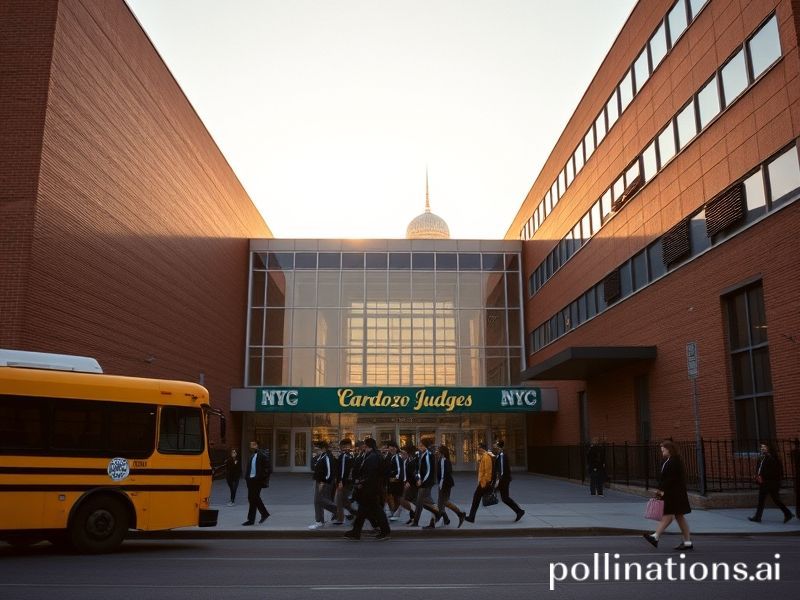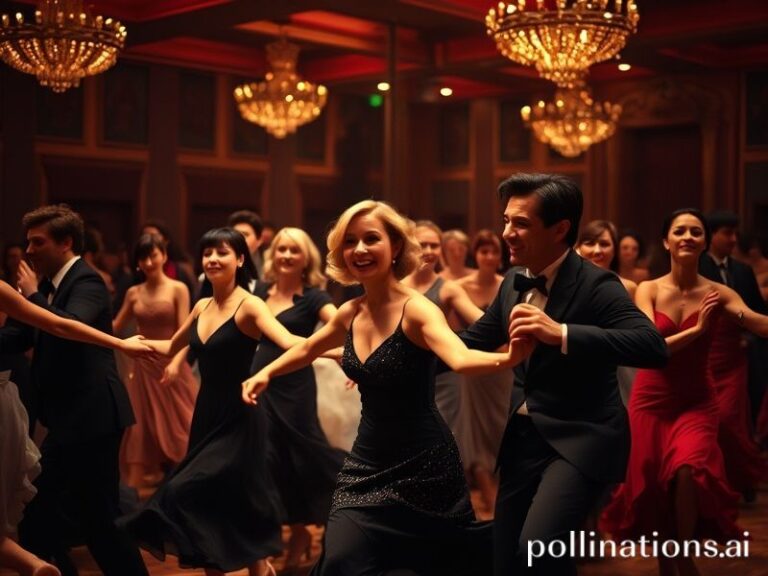Cardozo High: Inside the Queens Factory Where Global Teenagers Are Minted into Ivy-Ready Products
In Queens, New York, sits Benjamin N. Cardozo High School—a red-brick monument to the American conviction that meritocracy can be manufactured like plastic lawn flamingos. Named after the Supreme Court justice who once called law “a solemn farce,” the building now hosts a daily farce of its own: 3,800 teenagers trying to game the algorithm called “college admissions.” From the outside it looks like any other public school. Inside, it is a petri dish for the global arms race in credential inflation, a place where the American Dream is shrink-wrapped and sold by the Advanced Placement unit.
Consider the International Baccalaureate program across the river in Geneva, where diplomats’ children learn to quote Montesquieu before breakfast. Cardozo’s answer is the Da Vinci Science Research Program, whose alumni list reads like a LinkedIn wet dream: Intel finalists, Regeneron scholars, a kid who taught himself CRISPR between bodega runs. The school’s website boasts partnerships with CERN and the Weizmann Institute, as if teenagers shipping DNA samples to Israel were the natural heir to medieval apprenticeships. Meanwhile, in Lagos, a 15-year-old sells data plans to keep the lights on; in Shenzhen, another assembles iPhones to afford cram school. Cardozo’s students, by contrast, fret over whether their 4.7 GPA will “look rounded” to Northwestern. Same planet, different orbital mechanics.
The irony, delicious enough to spread on a bagel, is that Cardozo’s success depends on the very inequality it claims to defeat. The school draws from middle-class enclaves flush with Korean dry cleaners and Greek diners—immigrant strivers who discovered that the surest path to American legitimacy is beating WASPs at their own résumé-padding game. So we get the spectacle of PSAL championship fencing teams (because Harvard loves a foil-wielding polymorph), orchestras that can sight-read Stravinsky (because Juilliard won’t audition slackers), and a Model U.N. delegation that once out-delegated actual U.N. interns. Somewhere in a favela, a boy who can strip a carburetor blindfolded wonders why his talent doesn’t compute on the Common App.
Globalization has turned Cardozo into a minor diplomatic actor. When Seoul bans after-school academies after 10 p.m., Korean mothers simply relocate to Flushing and ship their kids to Cardozo for the authentic “American grind.” The school’s Mandarin newsletter—yes, it has one—recently advised parents on navigating the U.S. visa labyrinth. One guidance counselor now doubles as an informal consul, translating transcripts into the Esperanto of academic inflation: “Honors Precalculus” becomes “Mathematical Olympiad Track,” “Lunch Monitor” morphs into “Student Leadership in Nutritional Logistics.” The absurdity would be funny if it weren’t so ruthlessly efficient.
Teachers, those underpaid custodians of teenage ego, have developed coping mechanisms that would impress U.N. peacekeepers. A physics instructor grades lab reports while streaming Al-Jazeera in the background, muttering that at least Gaza’s problems end at sundown. The literature chair keeps a bottle of slivovitz in the filing cabinet labeled “Existential Crisis—Break Glass.” They know the game is rigged, but rigging it better has become its own morality play. After all, if the world insists on ranking 17-year-olds like crypto tokens, someone must run the exchange.
And yet, beneath the cynicism, something stubbornly human persists: the girl who builds telescopes from discarded lenses, the boy who writes code to map opioid overdoses in real time, the janitor who sneaks leftover lab rats to a wildlife rehabber in the Bronx. These acts don’t fit on a transcript, which is precisely why they matter. In a system designed to quantify adolescence, the unquantifiable becomes rebellion.
So Cardozo endures, a brick-and-mortar metaphor for our times: equal parts aspiration and absurdity, a place where futures are mortgaged before they’re earned. The bell rings, the students shuffle, and the planet keeps spinning—its contradictions neatly filed under “Extracurriculars.”







